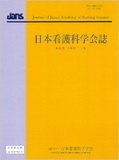Japanese
English
- 販売していません
- Abstract 文献概要
- 参考文献 Reference
要旨
目的:壮年期の軽症脳卒中患者のセルフマネジメント自己評価尺度案を作成し,信頼性・妥当性を検討する.
方法:先行調査および文献レビューを基に【知識の獲得】,【悪化予防の実施】,【資源の活用】の3概念からなる37項目の尺度案を作成し,外来に通院中の40〜65歳の軽症脳卒中患者に質問紙調査を行い,回答のあった93名を分析対象とした.
結果:尺度案は,確証的因子分析の結果,【知識の獲得】1因子構造7項目,【悪化予防の実施】3因子構造12項目,【資源の活用】1因子構造9項目からなる28項目で構成された.これらは,内的一貫性,基準関連妥当性,既知集団を用いた検討において,信頼性・妥当性が確認できた.
結論:尺度の信頼性・妥当性は概ね確保された.本尺度は,壮年期にある軽症脳卒中患者が悪化予防に向けた疾患管理に加え,心理社会的状況を包括して自己評価し得る尺度であると考えられた.
Objective: This study aimed to verify a self-evaluation scale for middle-aged mild stroke survivors' self-management status and examine its reliability and validity.
Methods: A questionnaire was created using 37 items based on a previous study that comprised three domains: “acquisition of knowledge”, “actions to prevent disease progression”, and “utilization of resources”. We conducted a survey among mild stroke survivors, aged 40-65 years, who visited the clinic. Data obtained from 93 patients were then analyzed.
Results: As a result of a confirmatory factor analysis, the scale comprised 28 items. A good fit was obtained for the 1-factor with 7 items relating to “acquisition of knowledge”, 3-factor with 12 items relating to “actions to prevent disease progression”, and 1-factor with 9 items relating to “utilization of resources”. Internal consistency and criterion validity was confirmed, and the scale was evaluated by a parallel group test.
Conclusion: The reliability and validity of the scale were almost confirmed. The scale included self-management contents unique to middle-aged mild stroke survivors, and was considered to be an index that can comprehensively self-evaluate disease management and psychosocial conditions among such individuals.
Copyright © 2022, Japan Academy of Nursing Science. All rights reserved.


